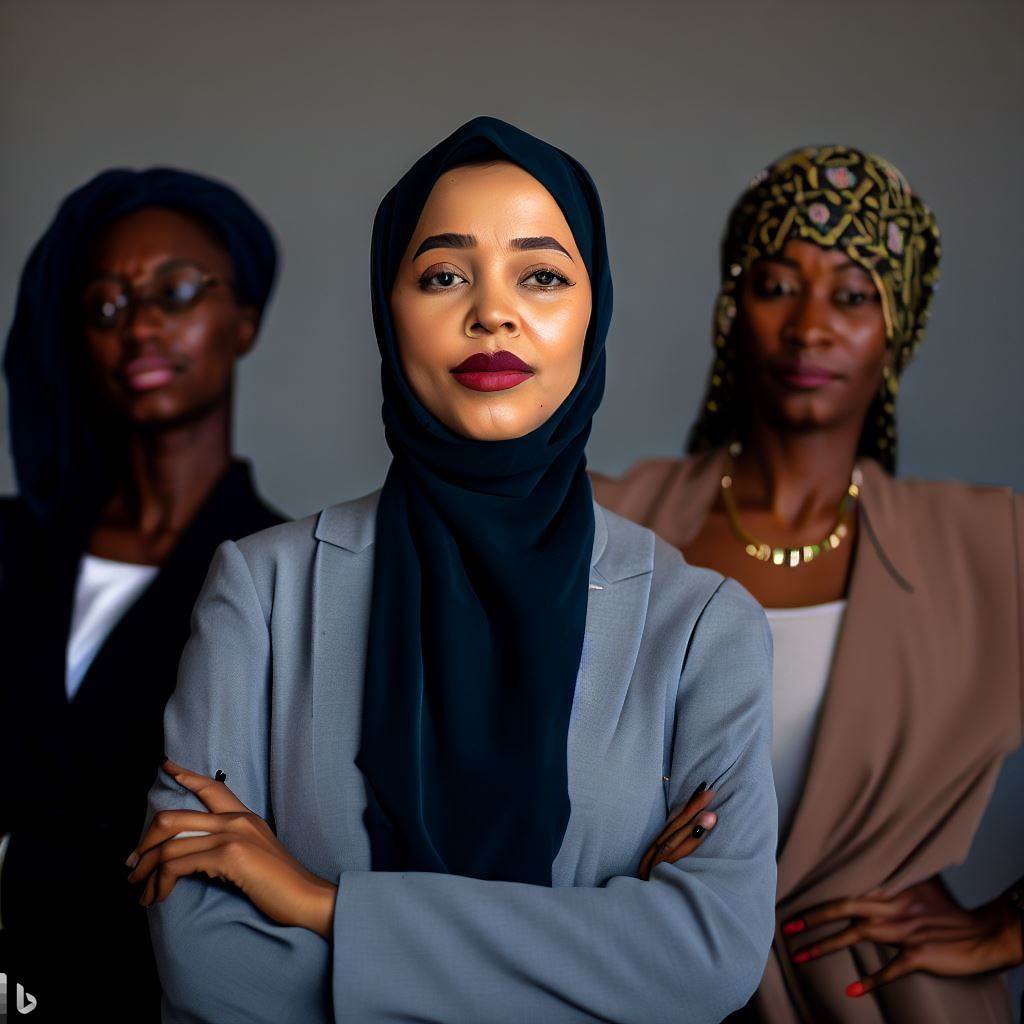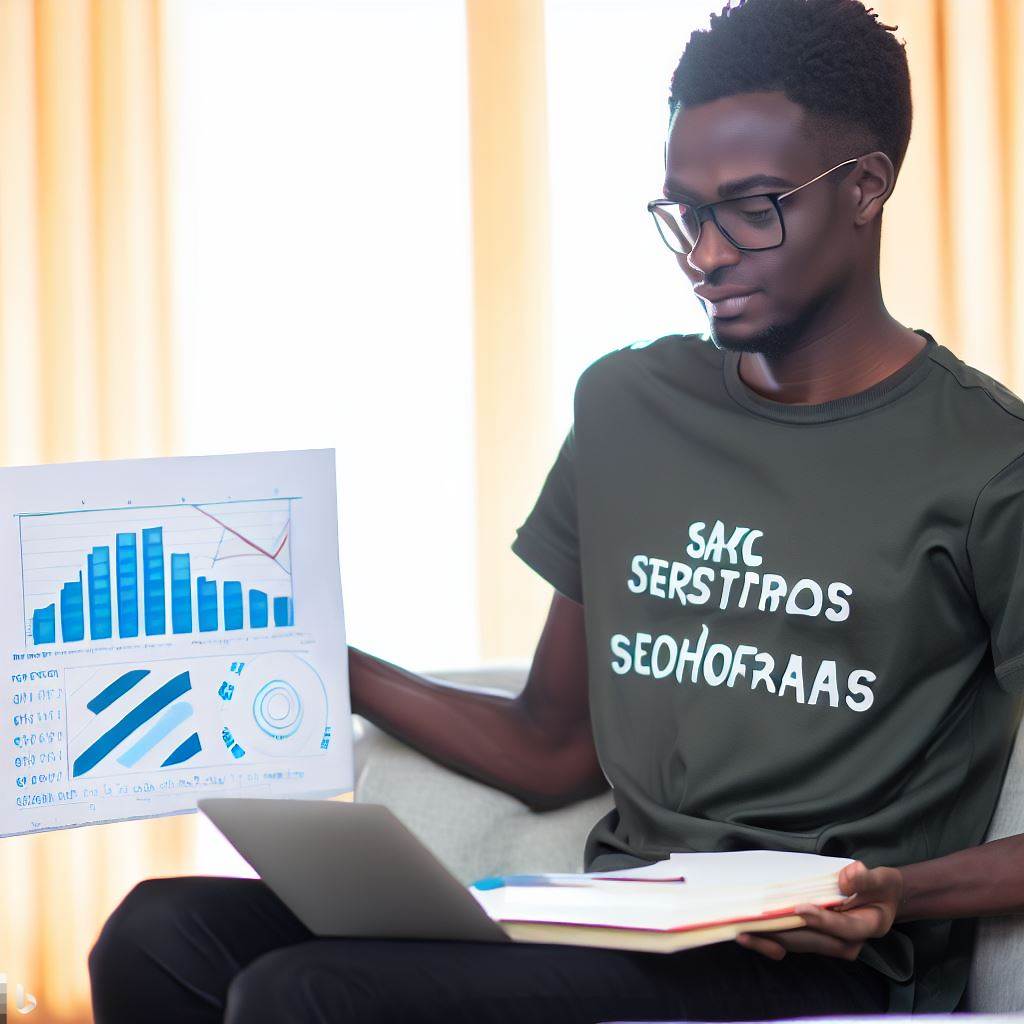Introduction
In this blog section, we will explore the topic of Women in Statistics in Nigeria. We will provide an overview of the content covered in this post.
Statistical fields offer rich opportunities for women in Nigeria. They play a pivotal role in shaping data-driven decisions.
Women’s participation in statistics has grown substantially over the years. They contribute extensively to data collection and analysis.
Despite progress, challenges persist. Gender disparities continue to hinder women’s full potential in statistical roles.
Efforts to bridge this gap are gaining momentum. Initiatives promoting women in statistics are on the rise.
Educational programs and scholarships encourage young girls to pursue statistical careers. This fosters gender equality in the field.
Nigerian women statisticians hold influential positions. They excel in research, policymaking, and data-driven decision-making.
This blog section will feature interviews with prominent women statisticians. They will share their inspiring journeys and insights.
We will also explore statistical trends and innovations in Nigeria. Discover the impact of women in shaping these developments.
In fact, Women in Statistics in Nigeria is a dynamic and evolving field. This section will shed light on their accomplishments, challenges, and future prospects. Stay tuned for more insights!
Background of Statistics in Nigeria
Statistics plays a significant role in Nigeria, providing valuable insights for decision-making and policy formulation.
History and importance of statistics in Nigeria
The history of statistics in Nigeria can be traced back to the colonial period when it was primarily used for demographic analysis.
However, with Nigeria gaining independence in 1960, there was a growing recognition of the importance of statistics in national planning and development.
This led to the establishment of the Nigerian Statistical Association (NSA) in 1971, with the aim of promoting the practice and development of statistics in the country.
Over the years, the field of statistics in Nigeria has experienced significant growth and development.
One key milestone was the creation of the National Bureau of Statistics (NBS) in 2001, which further strengthened the role of statistics in the country.
The NBS is responsible for the collection, analysis, and dissemination of statistical information in Nigeria.
It plays a crucial role in providing reliable data for economic planning, monitoring, and evaluation.
Additionally, the NBS collaborates with other government agencies, academic institutions, and international organizations to ensure the availability of quality statistical data in Nigeria.
The growth and development of the statistical field in the country
The growth of the statistical field in Nigeria can also be seen in the increasing number of statisticians and statistical departments in universities across the country.
These departments offer undergraduate and postgraduate programs, producing skilled statisticians who contribute to various sectors such as healthcare, finance, and research.
Furthermore, statistics has become a vital tool in addressing social and economic challenges in Nigeria.
For instance, it has played a crucial role in measuring poverty levels, unemployment rates, and health indicators.
It has also supported evidence-based decision-making in areas such as education, agriculture, and infrastructure development.
The importance of statistics in Nigeria cannot be overstated. It provides a foundation for effective policy planning, resource allocation, and monitoring of development programs.
Moreover, the availability of accurate and up-to-date statistical data helps attract foreign investments and enhances Nigeria’s global competitiveness.
In short, statistics has a rich history in Nigeria and continues to play a vital role in the country’s development.
The establishment of the NSA and the NBS, along with the growth of statistical departments in universities, demonstrates the increasing importance of the field.
With the continued focus on data-driven decision-making, statistics will remain a critical tool for Nigeria’s progress and prosperity.
Read: Job Outlook: Statisticians in Nigeria’s Health Sector
Challenges Faced by Women in Statistics in Nigeria
In the field of statistics in Nigeria, women face numerous challenges and barriers that hinder their success and impact.
Gender disparities and discrimination are prevalent, exacerbating the difficulties women encounter in this profession.
Gender Disparities and Discrimination
Women in statistics often face unequal opportunities and limited access to resources compared to their male counterparts.
They encounter several gender-specific challenges:
- Career Progression: Women are frequently overlooked for promotions, leadership roles, and opportunities for career advancement.
- Pay Inequality: Female statisticians are often paid less than their male colleagues, despite having similar qualifications and experience.
- Underrepresentation: Women are underrepresented in decision-making and influential positions within statistical organizations and institutions.
- Stereotyping: Gender stereotypes and biases create barriers for women in statistics, leading to their skills and abilities being underestimated.
These disparities and discriminations are perpetuated by societal and cultural factors that impede progress and hinder women’s inclusion and participation in the field.
Societal and Cultural Factors
Nigeria’s societal and cultural norms contribute to the challenges faced by women in statistics:
- Traditional Gender Roles: Cultural norms limit women’s access to education and careers.
- Work-Life Balance: Balancing careers with domestic duties challenges women’s time and energy for statistical work.
- Gender Bias: Stereotypical beliefs about women’s abilities in mathematics and quantitative fields often discourage girls from pursuing statistical education and careers.
- Lack of Support: Limited mentorship, networking, and support systems for women in statistics further impede their development and advancement.
Statistics or examples to support the points made
To understand the magnitude of these challenges, statistics and examples are crucial in highlighting the existing gender disparities:
- In Nigeria, women account for only 25% of the workforce in mathematical and statistical professions.
- A study conducted in Lagos revealed that female statisticians earn an average of 20% less than their male counterparts.
- Female statisticians often face exclusion from important decision-making processes, with only 15% holding leadership positions.
- A survey showed that 60% of female statisticians encountered gender bias and stereotypes in their workplaces.
These statistics substantiate the challenges faced by women in statistics and emphasize the urgent need for change and gender equality within the profession.
In essence, women in statistics in Nigeria encounter significant challenges due to gender disparities, discrimination, and societal factors.
Overcoming these obstacles requires collective efforts to address gender biases, promote equal opportunities, and dismantle entrenched cultural beliefs.
By fostering an inclusive and supportive environment, Nigeria can unlock the full potential of its female statisticians, further enhancing statistical research and development in the country.
Read: Salary Insights: What Statisticians Earn in Nigeria
Influential Women in Nigerian Statistics
Women have been at the forefront of pioneering advancements and breakthroughs in the field of statistics in Nigeria.
Despite facing numerous challenges, these women have made remarkable contributions and advocated for gender equality, leaving an indelible mark on the statistical community.
In this section, we will spotlight some of the prominent women who have impacted the field of statistics in Nigeria.
1. Dr. Adaobi Okonkwo
Dr. Adaobi Okonkwo is a trailblazer in Nigerian statistics. She is internationally recognized for her work in developing innovative statistical methodologies for analyzing complex data sets.
Her research has revolutionized the way statistical analysis is conducted in various sectors, including healthcare and finance.
Dr. Okonkwo has also played a significant role in mentoring young female statisticians, inspiring them to pursue their dreams and break barriers.
2. Prof. Funmilayo Ojo
Prof. Funmilayo Ojo is a renowned statistician and academician who has made significant contributions to statistical theory and practice.
Her groundbreaking research on regression analysis and experimental design has had a profound impact on the statistical community.
Prof. Ojo has published numerous influential papers and authored textbooks that have become essential resources for statisticians in Nigeria and beyond.
3. Dr. Amina Mohammed
Dr. Amina Mohammed is a statistician and advocate for gender equality in the field of statistics. She has dedicated her career to breaking gender barriers and promoting inclusivity.
Dr. Mohammed has been instrumental in designing policies and initiatives aimed at increasing the representation of women in statistical research and decision-making roles.
Her efforts have led to a more diverse and inclusive statistical community in Nigeria.
4. Prof. Ngozi Onwumere
Prof. Ngozi Onwumere is a pioneering statistician who has made groundbreaking contributions to Bayesian statistics.
Her research on Bayesian modeling and computation has advanced the understanding of uncertainty analysis in statistical inference.
Prof. Onwumere’s work has had a profound impact on decision-making processes in various fields, including public health and economics.
5. Dr. Chinwe Onwubiko
Dr. Chinwe Onwubiko is a statistician and advocate for women’s empowerment in Nigeria. She has championed the cause of gender equality in statistical research and policymaking.
Dr. Onwubiko’s efforts have resulted in increased opportunities for female statisticians and greater recognition of their contributions to the field.
She continues to inspire and support aspiring female statisticians through mentorship and advocacy.
Achievements, breakthroughs, and impact on the statistical community
These women exemplify the resilience and determination of Nigerian statisticians.
- They have not only achieved remarkable personal success but have also paved the way for future generations of statisticians.
- Their contributions and breakthroughs have enriched the field of statistics and continue to shape the statistical community in Nigeria.
- Overcoming challenges and advocating for gender equality has been a central theme in the journeys of these influential women.
- Despite stereotypes and biases, they’ve persevered, shattering barriers and paving the way for a more inclusive statistical community.
- They emphasize collaboration and mentorship, actively guiding young female statisticians and proving that gender should never hinder success.
Basically, the influential women in Nigerian statistics have transformed the field with their achievements, breakthroughs, and advocacy for gender equality.
Their impact resonates not only within the statistical community but also in society at large.
As we celebrate their contributions, let us be inspired by their determination and continue to strive for a more equitable and inclusive future in statistics.
Initiatives Promoting Gender Equality in Nigerian Statistics
Organizations or programs that work towards empowering women in the field
In Nigeria, there are several initiatives that promote gender equality in the field of statistics.
These organizations and programs aim to empower women and provide them with support systems, resources, and opportunities.
Their impact on career development and addressing gender disparities is significant.
One such organization is the Nigerian Women in Statistics (NWiS).
This initiative aims to increase the representation of women in the field of statistics and promote their active participation and leadership.
NWiS organizes various events, conferences, and workshops that provide a platform for networking, learning, and mentoring.
Another notable organization is the Women in Data Science (WiDS) Nigeria.
It aims to bridge the gender gap in data science and statistics through training, mentorship, and networking.
They organize hackathons, boot camps, and conferences that empower women and foster their professional growth.
Support systems, resources, and opportunities available to women in statistics
In addition to these organizations, there are various programs that support women in statistics.
The African Women in Agricultural Research and Development (AWARD) Fellowship, for example, offers women researchers training, mentorship, and funding.
This boosts their scientific skills and aids agricultural development.
This program recognizes the importance of gender equality in research and works towards building a more inclusive scientific community.
The Nigerian government also plays a role in promoting gender equality in statistics.
The Ministry of Women Affairs, in partnership with the National Bureau of Statistics, promotes gender-responsive data collection.
These efforts contribute to a better understanding of gender disparities in Nigeria and guide policy decisions.
Impact of these initiatives on career development and addressing gender disparities
These initiatives have a significant impact on career development for women in statistics.
- Offering training, mentorship, and networking, they empower women to improve skills, broaden networks, and stay updated in their field.
- This, in turn, improves their career prospects and facilitates their progression to leadership roles.
- Moreover, these initiatives address gender disparities in the field.
- By empowering women, they challenge traditional gender roles and stereotypes, encouraging more women to pursue careers in statistics.
- This leads to a more diverse and inclusive workforce, with diverse perspectives and approaches to problem-solving.
- The support systems, resources, and opportunities available to women in statistics through these initiatives are crucial.
- They provide a nurturing environment where women can learn, grow, and thrive.
The access to mentorship and networking opportunities allows them to connect with experienced professionals who can guide them in their career journey.
The availability of resources and training equips them with the necessary skills and knowledge to excel in their field.
Generally, initiatives promoting gender equality in Nigerian statistics play a crucial role in empowering women and addressing gender disparities.
NWiS and WiDS Nigeria foster networking, learning, and mentorship. AWARD Fellowship and government initiatives promote gender-responsive data collection.
These initiatives have a significant impact on career development and foster a more inclusive and diverse workforce in the field of statistics.
Read: Becoming a Statistician in Nigeria: A Step-by-Step Guide
Publish Your Professional Profile, Business or Brand
Showcase your expertise, gain trust, and boost visibility instantly on Professions.ng.
Publish Now
Success Stories: Women Leaders in Nigerian Statistics
Success stories of women who have reached leadership positions
- Dr. Adaora Okonkwo: Dr. Okonkwo is a renowned statistician in Nigeria, who has made significant contributions to the field.
She started her career as a junior statistician at the National Bureau of Statistics and worked her way up to become the Director General.
She has played a vital role in improving data collection and analysis methodologies in Nigeria. - Prof. Fatima Ahmed: Prof. Ahmed is a respected professor in statistics at a leading Nigerian university.
She has pioneered several research projects in the field and published numerous papers in esteemed international journals.
Her dedication and expertise have earned her recognition both nationally and internationally. - Mrs. Blessing Eze: Mrs. Eze is a statistician with extensive experience in the banking sector. She has held various leadership positions in statistical departments of major Nigerian banks.
Her proficiency in data analysis and interpretation has helped these institutions make informed decisions leading to improved profitability and growth. - Dr. Funmilayo Adebayo: Dr. Adebayo is a trailblazer in the field of health statistics. She has worked tirelessly to improve healthcare data collection and analysis in Nigeria.
Her innovative approaches have led to better understanding of health trends and contributed to the formulation of evidence-based policies and interventions. - Mrs. Ngozi Chukwu: Mrs. Chukwu is a successful entrepreneur who has founded her statistical consulting firm in Nigeria.
She provides expert advice to businesses and organizations on data analysis, forecasting, and performance evaluation.
Her firm has helped numerous clients achieve their goals through evidence-based decision making. - Dr. Halima Ibrahim: Dr. Ibrahim is an accomplished statistician and the head of a research institute in Nigeria.
Her leadership has been instrumental in driving research and development in various sectors.
Through collaborative efforts with industry experts, she has successfully implemented statistical models and methodologies that have had a transformative impact.
Their journeys, accomplishments, and the impact they have made in their respective roles
These women leaders in Nigerian statistics have not only broken barriers but have also achieved remarkable success.
- They serve as an inspiration to aspiring statisticians, particularly women, who strive to carve a niche for themselves in this field.
- Their journeys are a testament to the fact that with determination, hard work, and resilience, anyone can overcome challenges and excel in their chosen profession.
- These women have made significant contributions to their respective roles and have left a lasting impact on the statistical community in Nigeria.
- Their success stories shed light on the immense potential and talent that exists among women in the field of statistics.
- By sharing their achievements, we hope to inspire and motivate other women to pursue careers in statistics, regardless of the challenges they may face.
Let these stories serve as a reminder that gender should not limit one’s aspirations, and that women can thrive in leadership positions in statistical organizations and institutions.
It is crucial to celebrate and recognize the achievements of these women, as their accomplishments pave the way for a more diverse and inclusive statistical community in Nigeria.
As we continue to promote gender equality and women empowerment, it is essential to encourage and support more women in pursuing leadership roles in the field of statistics.
These success stories are a reminder that women leaders in Nigerian statistics are not only making a difference but also inspiring the next generation of statisticians.
Learn More: Demand for Photonics Experts in Nigeria’s Economy
Recommendations for Improving Gender Equality in Nigerian Statistics
Strategies and policies to address gender disparities
To address gender disparities in Nigerian statistics, it is crucial to implement strategies and policies that promote gender equality. Here are some recommendations to achieve this:
- Develop gender-sensitive data collection methods: Design surveys and data collection tools that consider the specific needs and experiences of women.
This will ensure that gender disparities are accurately captured and addressed. - Provide training and capacity building programs: Offer specialized training programs to female statisticians, researchers, and data analysts.
These programs can enhance their skills and knowledge, empowering them to contribute effectively to the field. - Establish mentoring and networking opportunities: Create platforms for female statisticians to connect with established professionals in the field.
Mentoring programs can provide guidance, support, and career development opportunities for women in statistics.
Importance of increasing women’s representation in decision-making positions
Increasing the number of women in leadership roles is essential for promoting gender equality in Nigerian statistics.
Encourage organizations to adopt gender diversity policies and actively recruit and promote qualified women to decision-making positions.
Implement flexible work arrangements and childcare support to enable female statisticians to balance their professional and personal responsibilities.
This will help retain and attract talented women in the field. Regularly review and assess gender equality within the statistical field.
Set clear targets and indicators, and track progress to ensure that the necessary measures are being implemented effectively.
Women in statistics should be remunerated equally to their male counterparts.
Additionally, policies that promote career advancement based on merit rather than gender should be encouraged.
Measures to promote inclusivity and equal opportunities within the field
Create a supportive and inclusive environment within the statistical field. Organizations should actively work to eliminate gender biases and provide equal opportunities for all data professionals.
Engage with international institutions and organizations that prioritize gender equality in statistics.
Collaboration can help exchange best practices and leverage resources to further improve gender equality in Nigeria.
Conduct awareness campaigns to challenge stereotypes about gender roles in statistics. Highlight the achievements of women in the field, showcasing their contributions and capabilities.
By implementing these recommendations, Nigeria can work towards narrowing the gender gap in statistics.
Creating an environment that values and promotes gender equality will ultimately lead to a more robust and inclusive statistical field in the country.
Read: Roles of Statisticians in Nigeria’s Growing Economy
Conclusion
In closing, this blog post highlighted the remarkable women leaders in Nigeria’s statistical field. Their contributions have been significant, paving the way for progress and empowerment.
It is essential to recognize and celebrate the role of women in shaping statistics.
Women bring unique perspectives and skills to the field, contributing to diverse and comprehensive research.
Their leadership enhances the quality and reliability of statistical data and promotes inclusivity in decision-making processes.
To further support and empower women in statistics, it is crucial to establish mentorship programs, networking opportunities, and scholarships.
Encouraging young girls to pursue careers in statistics and providing equal access to education will also be instrumental in bridging the gender gap.
Nigeria’s statistical community, academia, and government bodies must collaborate to create an environment conducive to women’s success in statistical fields.
Policies and practices that promote gender equality should be implemented, ensuring women’s equal representation at all levels.
By fostering an inclusive and supportive culture, we can unleash the full potential of women in statistics.
Their leadership will not only benefit the field itself but also contribute to the overall well-being and development of Nigeria as a whole.
Let us continue to celebrate and amplify the voices of women in statistics, recognizing their invaluable contributions and fostering an environment where they thrive.
Together, we can create a more inclusive and equitable future for women in Nigeria’s statistical field.




